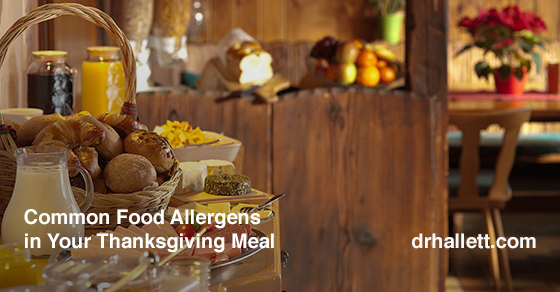
For most of us, Thanksgiving means fall, family and our biggest meal of the year. But for the millions of Americans with a food allergies, eating unfamiliar dishes like Aunt Sue’s green-bean casserole can cause reactions ranging from mildly irritating to life-threatening. For them, one key to a happy Thanksgiving is being aware of the most common food allergens and strictly avoiding them. The other is recognizing and managing any allergic reactions.
The federal Food and Drug Administration estimates that more than 160 different foods can cause allergic reactions. But the FDA says about 90 percent of those reactions are caused by only eight foods. The Big 8 are:
- Milk
- Eggs
- Fish
- Crustacean shellfish
- Tree nuts
- Peanuts
- Wheat
- Soybeans.
Chefs shopping for ingredients for a holiday gathering should read the label before putting that can in the cart. By law, ingredients that contain any of the eight major allergens must make that connection on the label. That’s why we see ingredients listed as “flour (wheat)” and “lecithin (soy).” Some labels list allergens separately at the end of the ingredient list.
Take questions to your allergist
Remember that the requirements of the Food Allergy Labeling and Consumer Protection Act don’t extend to meat, poultry and some egg products not regulated by the FDA. Also worth noting is this advice from the American College of Allergy, Asthma & Immunology:
“Some goods also may be labeled with precautionary statements, such as ‘may contain,’ ‘might contain,’ ‘made on shared equipment,’ ‘made in a shared facility’ or some other indication of potential allergen contamination. There are no laws or regulations requiring those advisory warnings and no standards that define what they mean. If you have questions about what foods are safe for you to eat, talk with your allergist.”
Thanksgiving substitutions
Thanksgiving begins and ends with turkey. If someone coming to dinner has food allergies, remember that some turkeys have a broth added to them that contains wheat starch. And beware of the gravy packet inside. It most likely contains wheat as well. Look for a turkey labeled gluten-free.
Allergy-free recipes are available for nearly any Thanksgiving staple, even mashed potatoes and stuffing. And there are alternatives for popular desserts, so skipping the pumpkin pie doesn’t have to be a problem. As dietitian Kristi Winkels notes on EatingwithFoodAllergies.com, “Even though a traditional Thanksgiving meal is full of common food allergens, you might be surprised to know that it doesn’t have to be. With a few substitutions you can have a feast free of the top 8 allergens.”
But be careful. As the American College of Allergy, Asthma & Immunology points out, “People allergic to a specific food may also potentially have a reaction to related foods.” The group says, “Learning about patterns of cross-reactivity and what must be avoided is one of the reasons why people with food allergies should receive care from a board-certified allergist.”
RAST testing to diagnose food allergies
Dr. Jeffrey Hallett offers diagnostic testing including the radioallergosorbent (RAST) test used to diagnose food allergies. Blood is drawn at an off-site laboratory and results are available usually available within three days. Testing is available for a variety of foods including dairy, eggs, fish, nuts and glutens. For more information about food allergies or to schedule a consultation, Click here: